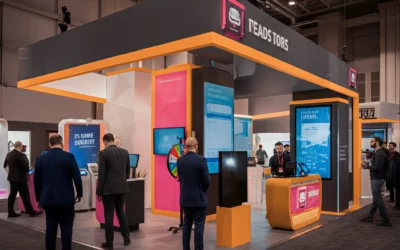When people hear the phrase “team building,” some might picture awkward icebreakers or trust falls gone wrong. However, the truth is far from that cliché. Corporate team-building events are far more impactful than many give them credit for. These events are a catalyst for better communication, enhanced collaboration, and an energized workforce. For HR professionals and event managers alike, understanding the value and potential of team-building events is essential.
This blog dives into the power of corporate team-building, offering 20 unique ideas to help you plan events that don’t just tick the box, but truly transform your team dynamics.
Why Are Team-Building Events Important?
Team-building events are much more than just activities to pass the time. They serve as purposeful opportunities to align, strengthen, and unify teams. Here’s why they matter:
- Improved Communication: Activities encourage open dialogue and foster better communication.
- Boosted Morale and Engagement: Breaking away from routine energizes employees and builds camaraderie.
- Strengthened Collaboration: Allows various departments to work together creatively.
- Enhanced Problem-Solving Skills: Many activities are structured around working together to overcome challenges.
- Positive Company Culture: Team-building reinforces shared goals and values, creating a more inclusive workplace environment.
With these benefits in mind, let’s explore some creative ideas to make your next team-building event unforgettable.
20 Creative Team-Building Event Ideas
To make planning easier, we’ve categorized these ideas into indoor activities, outdoor adventures, and virtual solutions for remote teams. Whether you’re looking for something small-scale or a large group engagement, there’s plenty of inspiration ahead.
Indoor Team-Building Ideas
- Escape Room Challenges
Create a themed escape room challenge where employees work in teams to solve puzzles and “break out.” Perfect for fostering communication, problem-solving, and collaboration.
- Office Olympics
From desk chair relays to paper toss competitions, host playful Olympic-style games to stir up friendly competition and teamwork.
- Innovation Labs
Dedicate a day to creative brainstorming sessions or hackathons where teams innovate solutions to internal business challenges. Recognize winning ideas for added motivation.
- Cooking Competitions
Challenge employees to work in teams to prepare a recipe. Assign roles like “head chef” or “taster” to make it fun and collaborative.
- Professional Workshops
Enlist experts to host workshops on topics like design thinking, emotional intelligence, or conflict resolution. These enrich employee skills and foster team growth.
- Board Game Tournaments
Set up a day of strategic board games like Codenames or Pandemic to encourage strategic thinking in a relaxed environment.
- Theme-Based Trivia Night
Organize a trivia competition based on themes that resonate with your staff, like favorite movies or company history, for some lighthearted fun and bonding.
- Charity Activity
Assemble care packages or collaborate on a project supporting a chosen nonprofit. Team-building meets meaningful impact.
Outdoor Team-Building Ideas
- Scavenger Hunts
Build a city-wide or campus-focused scavenger hunt that requires teamwork to find clues and complete challenges. Add checkpoints or mini prizes to make it even more engaging.
- Obstacle Course Activities
Set up team-based obstacle courses where members must work together to succeed, reinforcing trust and problem-solving.
- Sports Tournaments
Whether it’s soccer, volleyball, or even frisbee, playing sports together builds collaboration, teamwork, and a friendly sense of competition.
- Picnic Retreats with Team Challenges
Combine a relaxing picnic setting with team challenges like tug-of-war or relay races for an engaging day of fun and bonding.
- Nature Treasure Hunt
Organize an outdoor treasure hunt in a park or forest. Teams must use maps or GPS coordinates to find hidden items while enjoying nature.
- Volunteering for Social Good
Encourage employees to give back to the community by organizing a park clean-up or spending a day at an animal shelter. Bonding through doing good is incredibly rewarding.
- Boat or Kayaking Adventure
Plan a group outing on water where employees team up to row, steer, or paddle. This fun activity requires teamwork and trust.
Virtual Team-Building Ideas (for remote/hybrid teams)
- Virtual Escape Room
Have remote employees collaborate online to crack codes and solve puzzles from the comfort of their homes.
- Online Mixology or Cooking Classes
Send ingredient kits to participants and host a live virtual cooking or cocktail-making session led by an expert.
- Trivia Quizzes
Create a themed trivia quiz via platforms like Kahoot or Quizizz. Include fun company-centric questions to personalize the experience.
- Virtual Scavenger Hunt
Host a scavenger hunt where employees collect items from their homes or complete fun online challenges together.
- Wellness Sessions
Host virtual mindfulness, yoga, or stress-management workshops to promote mental health while building team connections.
Bonus Ideas for Deeper Engagement
- Murder Mystery Dinners
Employees can dress up and play roles in a theatrical murder mystery dinner where teamwork solves the “crime.”
- Art Workshops
Teams collaborate to produce a shared mural or piece of art, fostering creativity and cooperation.
- Leadership Challenges
Assign teams real-world business problems to solve within a set time frame to identify leaders and innovative thinkers.
Planning Tips for a Successful Team-Building Event
A well-thought-out plan makes all the difference. Here are a few tips to ensure success:
- Define Objectives: What do you want to achieve? Improved communication? Stronger collaboration?
- Know Your Team: Understand their preferences, comfort levels, and physical abilities to choose inclusive activities.
- Communicate Well: Share clear instructions and schedules to ensure everyone understands what to expect.
- Gather Feedback: Post-event surveys can help you assess the success and make improvements for future events.
Elevate Your Team-Building Experience
Corporate team-building doesn’t have to be an afterthought or a dull obligation. When done right, it becomes a strategic tool to foster engagement, nurture collaboration, and create a more motivated workplace.
If you’re ready to create experiences that your employees will talk about for months to come, we’re here to help. Book a session with us today to bring your team-building vision to life.
You might also like...
Top 10 U.S. Meeting Destinations for 2026
Successful corporate events don’t just happen — they’re built on smart decisions, starting with...
The Trade Show Prep Guide: Boost ROI Like a Pro
Trade shows are a powerful way to elevate your brand's visibility, connect with potential...
President’s Club 2026 Ultimate Gift Guide
Luxury, Personalization, and Impact for Unforgettable Incentive Travel President’s Club isn’t just...




